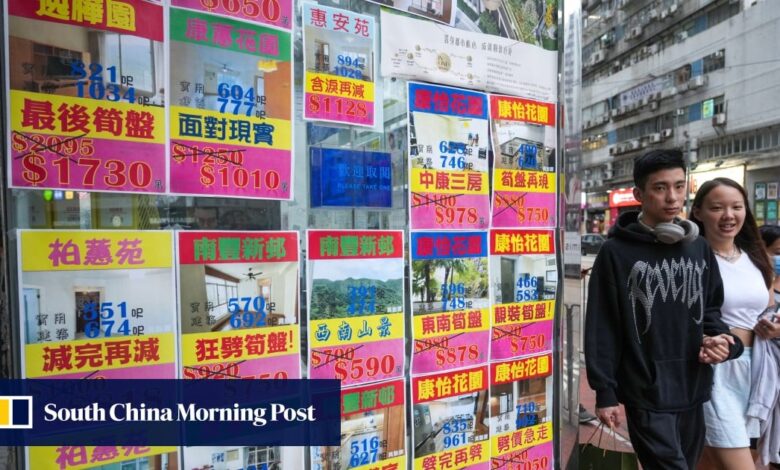Exclusive: Hong Kong policy address 2023: John Lee ‘expected to adjust stamp duty for some home transactions, unveil plans to boost birth rate’

As of September, the city has recorded only 8,792 new home sales this year, and is expected to see about 11,000 deals for the whole of 2023, according to major property agency Centaline earlier this month. It said the figures were likely to be the second-lowest in nearly a decade.
Official lived-in home prices in August also marked four straight months of decline.
Authorities have introduced measures to curb speculation in the property market since 2010. Under the policies, buyers are required to pay stamp duty equivalent to 10 to 20 per cent of the home price if they sell their properties within three years of purchasing them. They are subject to a higher percentage if they sell earlier.
Non-first-time buyers also need to pay 15 per cent stamp duty, while non-locals or companies have to pay 30 per cent.
The insider said more measures were being finalised to improve the conditions of people living in subdivided homes. The policy address was expected to explore ways to speed up the creation of more community living rooms for children residing in the subdivided flats, the person said.
Lee is also set to roll out new measures to address structural problems in the economy, which are aggravated by an ageing population and sluggish diversification of activities.
“There will be new incentives to encourage couples to give birth, apart from strengthening existing policies on welfare and childcare services. It will be a highlight,” the source said.
Hong Kong should cut stamp duty for residents buying another flat, DAB says
Hong Kong should cut stamp duty for residents buying another flat, DAB says
Political parties have floated proposals including giving cash incentives to parents with newborns. Government sources have not ruled out such measures.
But authorities will not implement a proposal by Regina Ip Lau Suk-yee, convenor of key decision-making body the Executive Council, to extend the permitted storage period for eggs, sperm and embryos, according to other sources. They said her idea would have given couples an option to postpone pregnancies, making the measure counterproductive.
The number of births in the city has been declining, with 32,600 recorded in the year to June, down from 35,100 over the preceding 12 months.
Hong Kong’s workforce will also reduce from 3.82 million this year to 3.58 million, and will account for 43 per cent of the total population of 8.19 million by 2046. One in three people would be aged 65 or above by then.
The insider said a series of new policies would also be announced to boost the city’s status as a regional innovation hub amid more sanctions by the United States against China. The measures include attracting companies to conduct biomedical research by setting up a platform to share health data with mainland cities. The government aims to set up a drug approval authority in the long run and speed up the development of the third generation of semiconductors, according to the source.
Hong Kong’s leader must get tough on climate change in policy address: green groups
Hong Kong’s leader must get tough on climate change in policy address: green groups
“These measures will benefit and speed up the development of the research hub at the Lok Ma Chau Loop, and are likely to become a KPI of the administration,” the source said.
As part of a new drug approval process, authorities would ask pharmaceutical companies for only one registration certificate instead of two or more.
Health minister Lo Chung-mau told the Post in an interview in June that Hong Kong should radically boost its research and development capabilities and consider setting up its own drug regulatory approval system similar to the Food and Drug Administration in the United States, as a key lesson learned from the Covid-19 pandemic.
Lo said providing the city with a powerful body that could approve products for the market would also attract pharmaceutical firms that often carried out research where such a regulator was based.
Under Beijing’s latest blueprint for national development, Hong Kong should establish itself as a hub for innovation and technology.
The State Council also announced in August a blueprint for the Lok Ma Chau Loop developments, which analysts said was a move by Beijing to put pressure on the city and Shenzhen to speed up the cooperation at the site, where clusters of top laboratories and research institutes should be formed by the mid-2030s.





